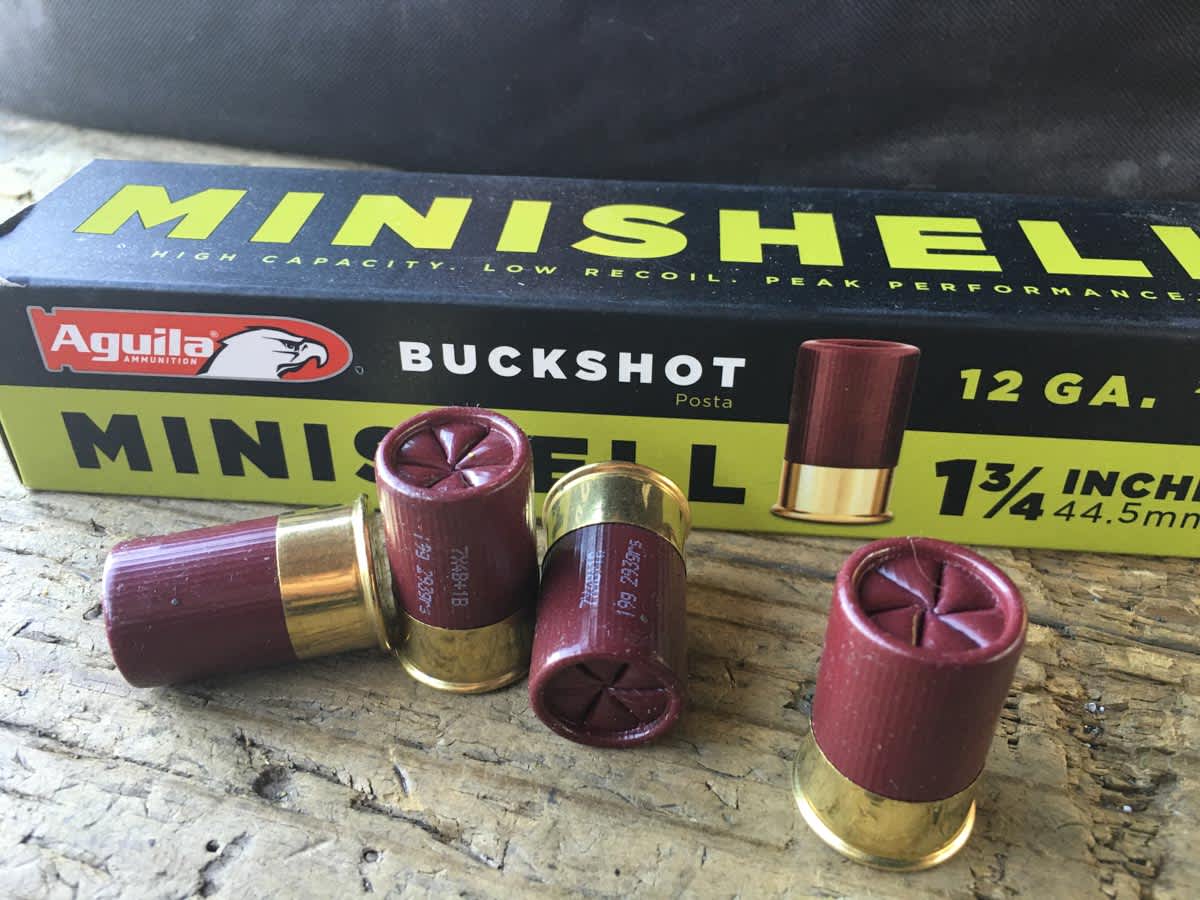The Aguila Minishell: The Little Shotshell That Could
Tom McHale 08.03.18

Who says great things can’t come in small packages?
I’ve been itching to try the newly-reintroduced Aguila Minishells for quite some time, so after getting the lowdown on them at the 2015 National Association of Sporting Goods Wholesalers convention, I arranged for a trial of two different Minishell loads: slugs and buckshot.
The “mini” part of Minishell is the key here. These shotshells are just 1-3/4 inches tall. That’s a full inch shorter than a standard 12-gauge shotshell. Why make a tiny shotshell? There are two primary reasons.
First, I don’t know about you, but I don’t particularly enjoy shooting lots of 12-gauge slug and buckshot loads. They pack a wallop when it comes to recoil, noticeably more than most birdshot or clay target loads. As recoil is in direct relationship to the weight of whatever projectile(s) are expelled out the muzzle, a smaller and lighter load will inflict a lot less pain on the shooter’s shoulder.

Second, the small size allows you to pack more in your gun and carry more in reserve.

Those are two pretty good reasons, provided these shells perform well enough to do the job. So what is the job? To evaluate that question, let’s take a look at the ballistics of the two loads.
The Minishell slug load packs a 7/8-ounce lead projectile. That translates to about 383 grains, more than three times the weight of a standard 9x19mm bullet. The Minishell launches its 383-grain lead slug at 1,250 feet per second, generating 1,328 foot-pounds of kinetic energy. That’s more energy than a standard 55-grain 5.56mm NATO rifle cartridge has at the muzzle. To compare to a full-sized slug load, the Winchester Super-X launches a one-ounce (437.5-grain) lead slug at 1,600 feet per second, generating 2,487 foot-pounds of energy.

The Minishell buckshot load packs 5/8-ounces of buckshot pellets and moves them at 1,250 feet per second. That translates to 273.4 grains of lead going downrange, generating 948 foot-pounds of energy. That’s still more projectile weight than two 9x19mm bullets or a single, fat .45 ACP projectile, and the energy level easily exceeds double the amount of most standard handgun cartridges.

So what can you do with these Minishells? Certainly the slug load has enough oomph for hunting, provided you keep to shorter ranges. At its slower 1,250 fps speed, the slug will drop pretty quickly and bleed off energy rapidly, so keep to closer targets. Personally, I think both slug and buckshot loads would make great home-defense options. The ballistics are very favorable when compared to handgun rounds, but the real benefit is the ease of aim with a long gun and the exceptionally light recoil. Firing these from a standard shotgun is actually pleasurable. Out of habit, I braced myself for the first slug shot, but as it turned out, that was completely unnecessary. Recoil was closer to that of a .22 LR rifle than any shotshell load I’ve ever fired.

It’s important to note what the Minishells won’t do. Given their low projectile weight and lower velocity levels, they’re not designed to function in semiautomatic shotguns. Instead, they’re designed for break-open and pump designs. While you can fire single shots from a semiautomatic, there’s not enough energy to cycle the action. That’s the price of higher magazine capacity and exceptionally low recoil.
Just for kicks, I tried them in a Beretta 1301 Tactical semiautomatic shotgun and found the single-shot limitation to be true. There just wasn’t enough juice to drive the bolt all the way back to eject the empty shell and shove a new one into place. I’ve heard reports of them working in some semiautos, but be aware that’s not how they’re intended to work. Who knows? You might just get lucky, so it’s worth a try. If you’re going to run these in a pump gun, buy a box for trial before ordering a pallet load just to make sure they cycle happily in your particular gun.
I want to come back to the buckshot loads because they’re particularly interesting. Rather than jam a small number of large 00 pellets into the tiny shell, Aguila includes a mixture of shot pellet sizes. The buckshot shells contain seven smaller 4B pellets and four larger 1B pellets. As I was cutting a shell open, it appeared that the larger pellets were packed on top of the seven smaller ones.
Curious as to how this combination would pattern, I set up a 14-inch square target at a distance of 10 yards. I fired three shells at the center of the target to get a semi-scientific idea of average grouping performance. With three shots, a total of 33 pellets were fired consisting of 12 1Bs and 21 4Bs. When I retrieved the target, I counted 25 holes within the 14-inch square, but several were overlapped so there may have been more on the paper. If you plan to try these for home-defense use, just be aware of the wide patterning. That can certainly be a benefit at short indoor distances, just know that the shot pellets will spread out quickly.

All in all, these are some pretty nifty shells. You can get much of the benefit of shotgun slugs and buckshot without the punishment of full-size and full-power loads.
Tom McHale is the author of the Insanely Practical Guides book series that guides new and experienced shooters alike in a fun, approachable, and practical way. His books are available in print and eBook format on Amazon.

